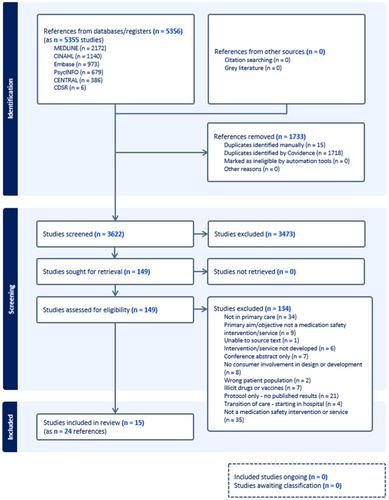Medication-related problems remain a significant burden despite the availability of various interventions and services in primary care. Involving health care consumers to design interventions or services across health disciplines is becoming more widely used as this type of engagement reportedly leads to more accessible, acceptable and sustainable health services and quality of life. We conducted a scoping review to examine when and how consumers have been involved in the design and development of medication safety interventions or services within the primary care.
We searched five key databases (MEDLINE (EBSCOhost), CINAHL (EBSCOhost), PsycINFO (EBSCOhost), Embase (Elsevier) and Cochrane Library (Wiley)) for relevant articles published up to February 2024. Studies were included if they involved adult consumers (≥ 18 years), their families, carers or the wider community as stakeholders. This review only included studies where the aim was to improve safe and effective medication use, delivered exclusively in primary care. To examine consumer involvement approaches and methods we adapted a framework describing the stages of consumer involvement for the data extraction tool.
Overall, 15 studies were included (comprising 24 articles). Codesign, experience-based codesign, coproduction and participatory action research were commonly used approaches. Meetings, interviews, surveys/questionnaires were commonly used methods. Two studies reported consumer involvement across all stages of the research study, and only one study described the consumer experience of being involved in the research process. The impact of consumer involvement on the effectiveness of these services or interventions was mixed.
The potential benefits of consumer involvement in the design and development of medication safety interventions or services may not have been fully maximised, given that genuine consumer involvement across all stages of the research study appears uncommon. More transparent and consistent reporting around the description of consumers involved, their experience of being involved and overall impact and quality of consumer participation is needed.
This scoping review was undertaken without consumers, patients, service users, caregivers or people with lived experience or members of the public due to resource limitations. This scoping review was undertaken and written by academics, who have undertaken codesign with consumers and stakeholders and also have personal lived experience of medication-related problems.



